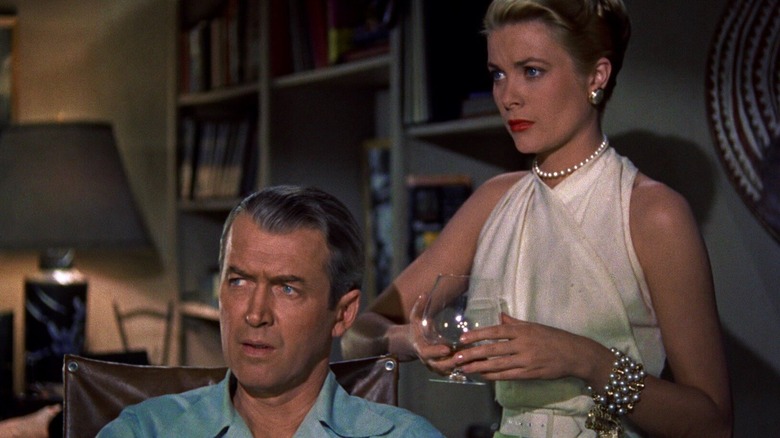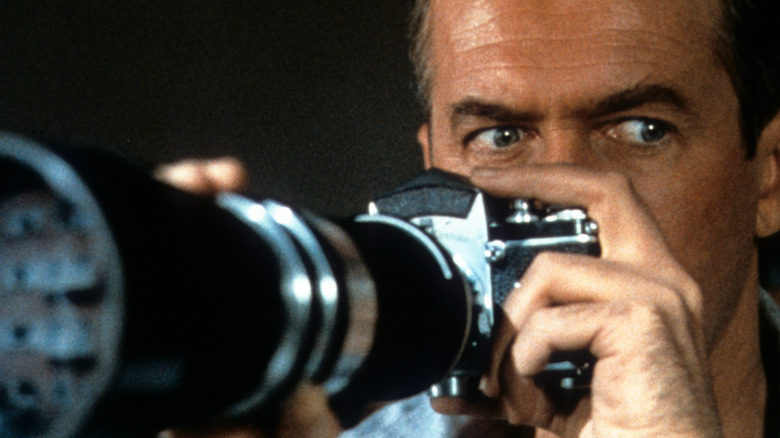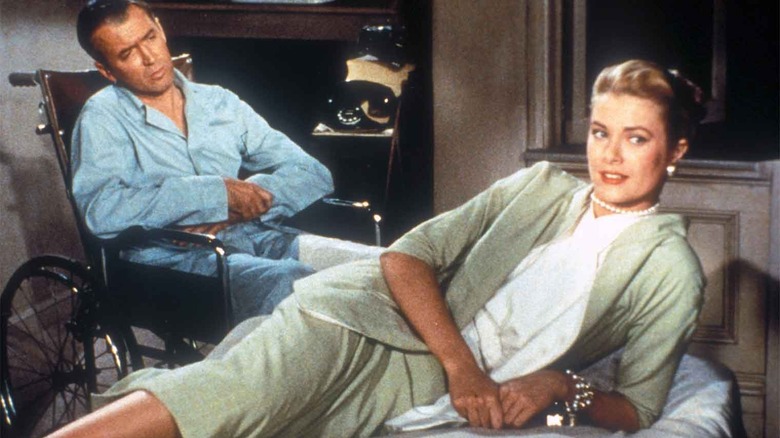James Stewart Went Blow-For-Blow With Alfred Hitchcock During Rear Window
Jimmy Stewart is remembered for his self-effacing persona, but offscreen he was no shrinking violet. The classic Hollywood actor often played non-threatening characters, from a bumbling statesman in "Mr. Smith Goes to Washington" to a bedridden journalist in Alfred Hitchcock's "Rear Window."
"Rear Window" was Stewart's second Hitchcock role, having previously played an ethics professor in "Rope." His character succumbs to an injury that puts him in a wheelchair, and he fills his time people-watching. One night, he witnesses what looks like a murder in the apartment across from him and notifies the police. When his claims are met with doubt, he tries to nab the killer himself by watching for hard evidence from his window.
Stewart and Hitchcock had a long working relationship, collaborating on four films. But that doesn't mean they always got along. Hitchcock had harsh words for actors, having famously referred to them as "cows" and "stupid children" (via Hitchcock Interviews). His low opinion of the profession caused him to clash with studio-era stars like Stewart. The director had a reputation for being meticulously controlling. Any actor who refused to be controlled — or, worse yet, had a creative vision of their own — would definitely butt heads with Hitch.
Stewart could out-shout Hitch himself
The conflict between these two major personalities came to a head on the set of "Rear Window." Character actor Wendell Corey, who plays the lieutenant investigating Stewart's claims, gives a surprising testimony to author Lawrence J. Quirk about what the actor was like on set.
Stewart was hiding "a whopping big ego underneath that allegedly shy, stuttering, bumbling persona," Corey revealed (via Express). Stewart was just as dominant as his director, duking it out over frame-ups and lighting choices on the "Rear Window" set. "When Jimmy Stewart didn't like the way a scene was going, he could yell with the best of them," Corey recalled.
Lots of actors are known for being divas on-set, but a Hitchcock set was like no other. Hitchcock was a notoriously powerful director, but Stewart managed to undermine him. Still, Corey insists that Stewart "could out-argue and out-shout Hitchcock — I even think Hitch got a little afraid of him at times," the actor admitted.
Jimmy toughened up but retained who he was
It seems uncharacteristic of Stewart to be so outspoken, but "there was steel under all that mush," Corey said.
Stewart often played a hapless dweeb, but spent many years in his later career diversifying his roles. After serving in World War II, he "had to toughen up" his persona to reflect his new, harsher interior world, he told author Tony Thomas (via Yahoo). He found that the best way to do this was to act in Westerns, like John Wayne's "The Man Who Shot Liberty Valance." This allowed Stewart to harden his image and "still retain what I was," as he put it.
Even though Stewart was tough enough to go toe-to-toe with Hitchcock, he still retained his softer side. His harsh attitude was balanced by the poise of his leading lady, Grace Kelly. Stewart described her as "kind to everybody, so considerate, just great, and so beautiful," (via Express).
Stewart would also remain friendly with Hitchcock for years to come, working with him again in "Vertigo" and "The Man Who Knew Too Much." Their relationship may have been contentious, but Hitchcock and Stewart ultimately put aside their creative differences to produce several unforgettable masterpieces, each more impressive than the one before.


